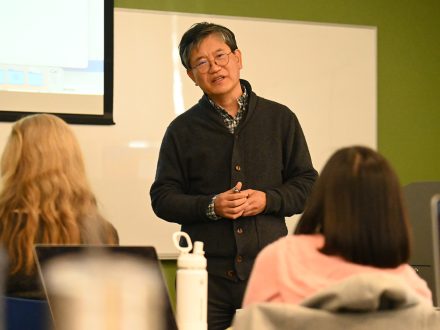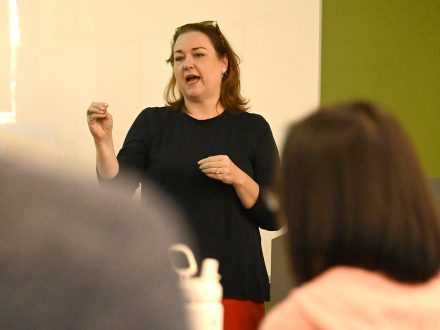Faculty members Amanda Sturgill, Byung Lee and Shannon Zenner led informal presentations for colleagues highlighting several artificial intelligence resources that can be leveraged in academic settings.
As questions abound about how artificial intelligence will be used, leveraged and regulated in classrooms and educational settings on Elon’s campus and across the nation, the School of Communications AI Working Group (AIWG) took a proactive approach last week hosting its first interactive “Tool Time” demonstration.

Two dozen faculty members gathered on Dec. 6 in a first-floor Long Building classroom to hear from three colleagues delving into resources, topics, websites and questions – plenty of questions – relating to AI and its potential uses. The presenters included Amanda Sturgill, associate professor of journalism, Byung Lee, associate professor of communication design, and Shannon Zenner, assistant professor of communication design, who each spoke for approximately 15 minutes. They explored the multifaceted applications of ChatGPT, highlighting its role as a collaborative thought partner in creating assignments and a resource for conducting research, including in-depth thematic analyses. Additionally, they showcased the effective integration of widely used AI-powered academic research tools like elicit.com and www.researchrabbit.ai to enhance the research process.
The informal presentations buoyed between ways the professors have successfully employed artificial intelligence resources, challenges they have personally faced, and the uncertainty of what is to come.
According to Alex Traugutt, assistant professor of sport management and chair of the school’s AIWG, the interactive demonstration fits the group’s charge to “serve as an incubator for school AI initiatives,” he said. Through events like last week’s “Tool Time” demonstration, AIWG hopes to provide useful opportunities to discuss AI, its impact on the school and its disciplines, and to provide guidance toward school policies and best practices on AI.
Traugutt said there are likely several factors that led to a strong faculty turnout Dec. 6, most notably the event’s relevance and timeliness.

“AI is a continued topic of conversation among faculty,” he said. “We have heard on numerous occasions that individuals are interested in utilizing these tools, but are overwhelmed by the sheer volume of them. This was a convenient way to explore new technologies that could enhance their teaching and research.”
He added, “Having faculty peers present also created a welcoming environment.”
Established during the fall 2023 semester, AIWG consists of 14 volunteer members representing all six of the school’s undergraduate majors. Working group members include Bill Anderson, Chris Chen, Ahmed Fadaam, Doug Kass, Sowjanya Kudva, Michele Lashley, Jessalyn Strauss, Brian Walsh, Sturgill, Lee, Zenner and Traugutt, as well as media analytics major Abby Shamblin ’23 and faculty emeritus Don Grady.
Traugutt said one of the initiative’s strengths is AWIG’s collaborative nature and the group’s interest level in AI-related topics. The chair credited Sturgill for proposing the group’s Dec. 6 gathering, which was further developed by the group at a recent meeting.
“We haven’t yet discussed future programming, but I think similar events will be organized in the spring semester,” Traugutt said. “As tools continue to evolve and be introduced, we feel it is imperative for our faculty to stay informed.”


